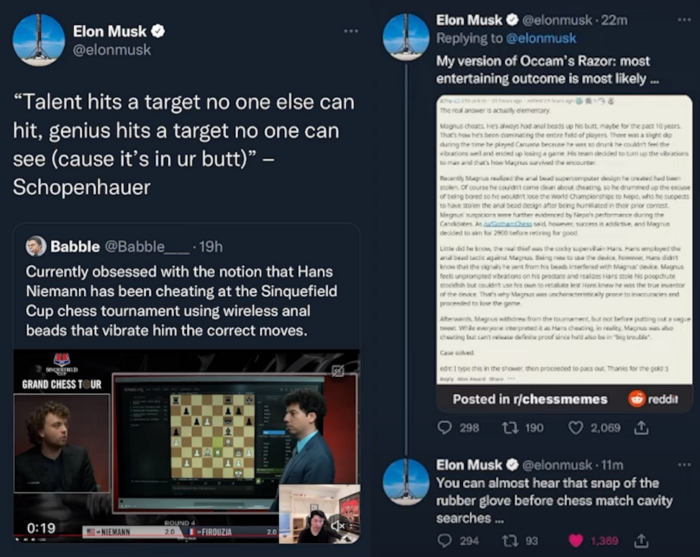There have been plenty of discussions of outside signaling devices contravening the rules of a sport or game, from trash cans to many more. But a new and rather personal one got some discussion this week as part of a long-brewing debate about Hans Niemann’s Sept. 4 chess win over Magnus Carlsen at the The Sinquefeld Cup tournament in St. Louis, organized by the Saint Louis Chess Club. And Elon Musk (seen above speaking at South by Southwest in 2018) played a major role in that, suggesting that vibrating anal beads might be a potential way to cheat.
What started this? Well, Danish grandmaster Carlsen, 31, is a long-established figure in the chess world, a five-time grand champion, the current top-rated player by FIDE (the international chess federation), and even the subject of a documentary called Magnus. Niemann, a 19-year-old originally from San Francisco, has also reached grandmaster status, but was the lowest-rated player in this tournament and a heavy underdog against Carlsen.
Niemann had previously beaten Carlsen at a different tournament a few weeks back. But his “The chess speaks for itself” interview afterwards drew lots of criticism. And that raised allegations that he might be cheating by receiving communication of how a chess “engine” (or AI program) would play in particular situations.
AI chess programs have been proven to be stronger than human players at the moment, so using moves suggested by one is specifically determined to be cheating, and tournaments not only have rules against that, they check players for potential communication devices. So the suggestion that someone is receiving moves from a chess engine is a very serious one. But that started after Niemann beat Carlsen on Sept. 4, and particularly after he gave a provocative post-match interview on the chess club’s YouTube channel:
“I think [Carlsen] was just so demoralized because he’s losing to an idiot like me. It must be embarrassing for the world champion to lose to me. I feel bad for him.”
The next day, Carlsen withdrew from the remainder of the tournament in unusual fashion:
I've withdrawn from the tournament. I've always enjoyed playing in the @STLChessClub, and hope to be back in the future https://t.co/YFSpl8er3u
— Magnus Carlsen (@MagnusCarlsen) September 5, 2022
That fueled further discussion of potential cheating, especially after American grandmaster Hikaru Nakamura put out comments on Twitch and then a widely-viewed YouTube video that actually suggested Niemann was cheating (although without suggesting how he might be doing that):
Where this got really wild is in the discussions of how Niemann might have received messages. Vice’s Karl Bode suggested a number of possibilities, including vibration-based buttons in a player’s shoes. Later, on a stream from another American grandmaster, Eric Hansen, a viewer suggested the possibility of cheating with anal beads, as while players are bodily checked for messaging devices, that does not include going to that degree of invasiveness.
Hansen acknowledged the idea, but said he was unfamiliar with if that was possible. That led to Musk (the CEO of Tesla and SpaceX, and the one-time purchaser of Twitter, and the speculated one-time purchaser of Manchester United) quote-tweeting Hansen’s stream Saturday with seemingly-joking suggestions about message-delivering anal beads, even invoking German philosopher Arthur Schopenhauer. That tweet has since been deleted, but was preserved by Matija Zagoranski on Medium and Hansen on a video response:
The “‘Talent hits a target no one else can hit, genius hits a target no one else can see (cause it’s in ur butt)’ – Schopenhauer” quote there really is remarkable. And, as with many things, Musk found an incredible way to make an already-percolating controversy overflow.
[The Riverfront Times, Matija Zagoranski on Medium, Joe Posnanski on Substack]; photo from Suzanne Cordeiro/special to The Austin American-Statesman, via the USA Today Network]







